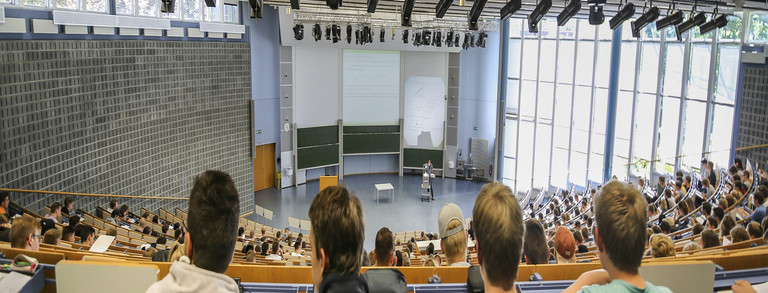Sociology
Summary
| Degree | Master of Arts (M.A.) |
|---|---|
| Subject group | Social Sciences and Cultural Studies |
| Standard program duration | 4 semesters |
| Admission requirements |
none
|
| Start of studies |
Winter semester
|
| Language | German |
| Enrollment requirements | |
| Further information | Department of Social Sciences |
| Department | Department of Social Sciences |
Overview
In the Master’s degree Sociology, our department profile "Life in Transformation" is deepened in various areas: What does the future of work look like? Can today’s standard of living and justice for future generations be reconciled (keyword sustainability)? What do mobility patterns look like in different countries and regions, from commuting to migration? What challenges - not only for pensions and care, but also, for example, for housing or education - do aging societies bring with them?
In the fields of
- Family and age(s)
- Migration and gender
- Structures and cultures of inequalities
- Work, organization and digitalization
- Socio-ecological transformation and social innovation
- Science and higher education
we focus on the interplay of space (e.g. from local to international contexts) and time (e.g. social change, future perspectives) in their socially constructed nature.
In addition, research workshops (your choice: qualitative or quantitative), overarching reflection modules, and a practicum module are integrating components of the program.
Skills and knowledge
Prerequisite for enrollment is a successful completion of
... the Bachelor of Arts in Sociology
... or comparable courses of study such as Bachelor of Arts Social Sciences
... or related courses of study such as Social and Cultural Sciences.
In parts, missing requirements can be fulfilled parallel to the MA program.
We are happy to advise which requirements must be met.
By the way: A certain grade point average for the Bachelor's degree is not required.
Do you find yourself here?
- Are you a graduate of a bachelor’s degree program in social sciences or related fields?
- Do you want to form more than just a superficial opinion?
- You are committed to things that convince you?
- You want to approach the questions empirically, but also reflecting conceptually?
Field of activity
The degree program opens up a wide range of career opportunities for you: It is important to get an individual profile! During your studies, you can develop your own profile by choosing courses or topics.
Possible areas of employment:
- (Further) in research: at universities, universities of applied sciences, vocational and technical academies or also at non-university research institutes.
- It is no longer possible without: whether social media (Internet, online media, apps) or ‚classic‘ media (e.g. radio, television): the effect and importance of media is undisputed.
- What usually only a few people think of when they think of ‚sociology‘: culture and sports (e.g. adult education, public relations).
- More and more important: private companies! Hardly any company can do without sociologists, be it in personnel/organizational development, marketing, foreign correspondence or quality and diversity management.
- Not only the pandemic has shown: organizations in the social sector and politics need sociologists, e.g. in quality management in health care, in international welfare associations or in urban development.
Additional information
In the Master’s degree program, 6 modules are studied in the (elective) compulsory area as well as the module for the Master’s thesis. The modules are divided in such a way that approx. 30 credit points have to be earned per semester.
- Methodological specializations: Master sociologists are prepared in detail for upcoming empirical master theses, e.g. through the courses Research Workshop and Research Designs.
- Internationality: Score with English skills? The second supervision of the Master's thesis can also be taken over by colleagues at foreign universities - perhaps this can even be combined with a shorter stay abroad? We support you in this!
- Relationship to the Bachelor of Sociology: Students who have previously studied the BA Sociology at TU Dortmund University will recognize some fields of social change. In the Master’s degree program, there are connecting points, but no duplications. This makes it clear that the Master’s degree program is attractive for both "old" and "new" Dortmunders!
Further information about the Master’s degree program can be found on the website of the Department of Social Sciences.




![[Translate to English:] Partner Four hands are holding the green logo of TU Dortmund University](/storages/tu_website/_processed_/1/d/csm_Partner_Nicole_Rechmann_KW_40b35bb3fd.jpg)




![[Translate to English:] Forschung An apparatus with tubes in a laboratory](/storages/tu_website/_processed_/0/c/csm_Forschung_Juergen_Huhn_cbd34afd6d.jpg)
![[Translate to English:] Studium Five students are sitting in a lecture hall. They are talking to each other.](/storages/tu_website/_processed_/c/9/csm_Studium_FelixSchmale_81d94adc86.jpg)





